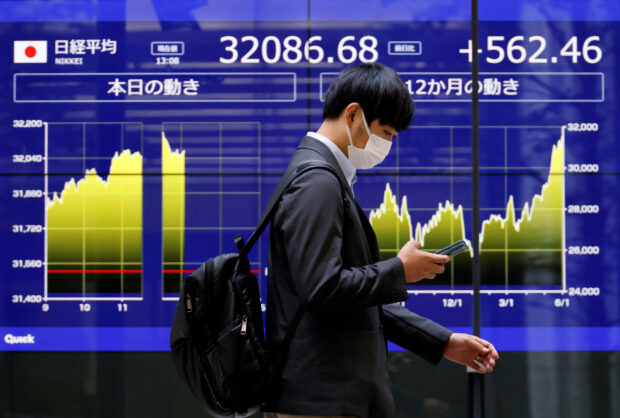A man walks past an electric monitor displaying Japan’s Nikkei share average and recent movements, outside a bank in Tokyo, Japan, June 5, 2023. REUTERS/Issei Kato/File photo
SINGAPORE – Asian shares slipped on Thursday after a surprise interest rate hike by Bank of Canada revived worries that U.S. rates could stay higher for longer and the Federal Reserve could remain hawkish when it meets next week.
MSCI’s broadest index of Asia-Pacific shares outside Japan was down 0.53 percent, while Japan’s Nikkei edged 0.08 percent higher. Australia’s S&P/ASX 200 index eased 0.09 percent.
The Bank of Canada (BoC) surprised markets on Wednesday by hiking its overnight rate to a 22-year high of 4.75 percent, with traders expecting another increase next month to ratchet down an overheating economy and stubbornly high inflation.
The BoC had been on hold since January to assess the impact of previous hikes.
“The BoC appears to feel that the resiliency in the economy allows it to be more aggressive in bringing inflation under control,” said Ryan Brandham, head of global capital markets, North America at Validus Risk Management.
The move from the BoC comes after Australia’s central bank also stunned markets by hiking interest rates earlier this week. The Reserve Bank of Australia also warned of more rate hikes to temper rising pricing pressures.
Two central banks in a row have now surprised hawkish, raising the risks of a Fed surprise next week, Saxo Markets strategists said in a note.
Economists push back expected Fed rate cut to 2024, poll shows
Markets are now pricing in a 68 percent chance of the Fed standing still next week, compared to 78 percent just a day earlier, the CME FedWatch tool showed. Traders are pricing for a 25 basis point hike in July.
Economists polled by Reuters expect the Fed to not raise rates at its June 13-14 meeting, but a significant minority expects at least one more hike this year.
More than 90 percent of economists, 78 of 86, polled during June 2-7 said the Federal Open Market Committee would hold its federal funds rate at 5 percent-5.25 percent.
China shares slipped 0.3 percent , while Hong Kong’s Hang Seng Index fell 0.57 percent.
Data on Wednesday showed May exports in China slumped 7.5 percent year-on-year, the biggest decline since January and far below the 0.4 percent decline analysts expected.
“The weak export numbers will have observers looking for a new round of policy stimulus,” Saxo strategists said.
Treasury yields were stable in early Asian hours after surging overnight after the move from Canada’s central bank.
The yield on 10-year Treasury notes was up 0.7 basis points to 3.791 percent, while the yield on the 30-year Treasury bond was up 0.2 basis points to 3.944 percent.
The two-year U.S. Treasury yield, which typically moves in step with interest rate expectations, was up 0.4 basis points at 4.554 percent.
In the currency market, the dollar index, which measures the U.S. currency against six major peers, eased 0.029 percent, with the euro up 0.09 percent to $1.0707.
The yen strengthened 0.14 percent to 139.91 per dollar after revised data showed Japan’s economy grew more than initially thought in January-March.
The Canadian dollar rose 0.08 percent to 1.34 per dollar, while Turkey’s lira hit a record low against the dollar as the newly re-elected government appeared to loosen stabilizing measures after signaling a pivot to more orthodox policies.
U.S. crude futures rose 0.03 percent to $72.55 per barrel and Brent was at $76.93, down 0.03 percent on the day.
Gold prices steadied on Thursday following a 1- percent drop in the previous session. Spot gold rose 0.3 percent to $1,944.85 an ounce. U.S. gold futures climbed 0.02 percent to $1,943.10 an ounce.
Bitcoin steadied in Asian hours and was last at 26,445 after sliding 3 percent overnight.
Read Next
Subscribe to INQUIRER PLUS to get access to The Philippine Daily Inquirer & other 70+ titles, share up to 5 gadgets, listen to the news, download as early as 4am & share articles on social media. Call 896 6000.
For feedback, complaints, or inquiries, contact us.
For all the latest Business News Click Here
For the latest news and updates, follow us on Google News.

